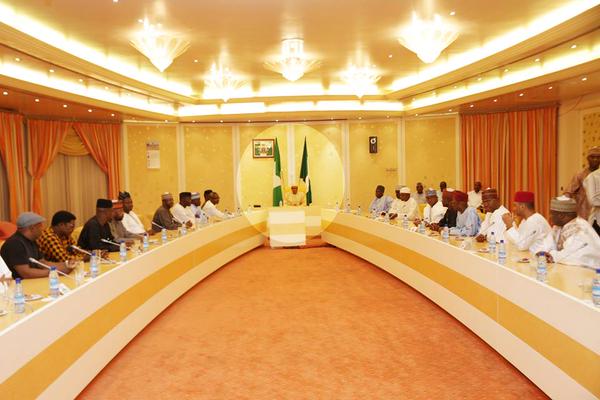Sen. Ita Enang, Special Adviser to President Muhammadu Buhari on National Assembly Matters (Senate), said submission of 2018 Appropriation Bill to the National Assembly in October was sacrosanct.
Enang gave the assurance when he appeared at the News Agency of Nigeria (NAN) Forum in Abuja, and said that the Federal Government was committed to the deadline.
He said that the government was working assiduously to ensure that the deadline was complied with to take the country back to the annual budget cycle of January to December.
According to him, different Ministries, Departments and Agencies (MDAs) have made their budget inputs and submissions to the Ministry of Budget and National Planning.
“The ministers are already appearing before the ministry and defending their submissions.
“It is intended that in the next few days they would have completed the exercise and have the total of the budget as well as get ready with the final draft.
“Everything is being done to ensure that we keep to the date,’’ Enang said.
He added that in presenting the 2018 proposal in October, “the national assembly will consider it between October and November and by December it would have been passed.
“The current budget will end in 12 months and having been signed on June 12, 2016, the budget is legally to run between June 12, 2017 and June 12, 2018.
“But the intention of the government is to make sure that the implementation date and assent will be for January 1, 2018 so that we will return the budget to the conventional January.’’
Enang also said that the national assembly was committed to doing its bit to ensure that the budget was passed in time after presentation by the Executive.
“This was a negotiated position between the executive and the legislature and in fact, the legislature is more anxious to get the budget passed by December and assented to in January.
“It is what was discussed and agreed and we are working together; there is harmony and there is understanding and unison on this subject.
“There is no matter that will frustrate this because all things were taken into account at arriving at this decision,’’ he said.
Examining the 2016 budget performance, the presidential aide said that the government recorded some constraints in the execution of capital projects.
He said, “we made it clear that most of the funds for capital projects will come from borrowing and if it has to come from external sources, it will have to be approved by the national assembly.
“If the national assembly approves the borrowing and the international agency from which you intend to borrow the money did not release the money, you cannot release it for capital projects.
“Also, sometimes it is the slow procurement process by different ministries that affect the implementation of capital projects.
“Some get proactive by setting timelines of when they will advertise, open the bid, open for selection and when they will seek certificate of no objection, while some ministries start it late.
“Some start it and get stuck within their processes and sometimes one file lies in one place or the other in longer time so it affects the procurement.
“This is one of the things that affect capital implementation.’’
Enang further said that passage of statutory budgets of government corporations and agencies by the national assembly when it resumed Sept. 26 from its seven-week recess was vital to reviving the economy.
According to him, the passage of budgets of agencies like the Nigerian National Petroleum Corporation, Central Bank of Nigeria, Federal Inland Revenue Service and the Nigeria Customs Service will boost the country’s economy.
He explained that approval of budgets of the statutory corporations and agencies was a requirement of the law that must be carried out by the national assembly.
Enang said that the process was crucial in making life bearable for the citizenry.
“It has become necessary for Nigerians to know that it is time for this country to begin to rip dividends from its own investments.
“The world has given notice to Nigeria and the economy of the world that oil is going to be less important and that makes it necessary for us to go back to the investment we made in each of these parastatals.
“So, approval of these budgets as the national assembly resumes will create employment, make money available to fund the budget and make it certain that the parastatals are now contributing non-oil revenue to the budget,’’ he said.

